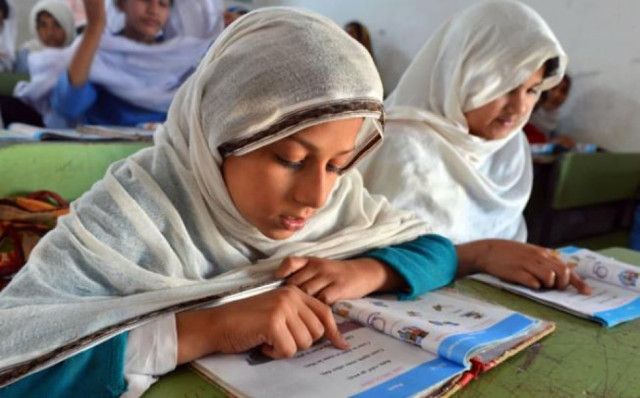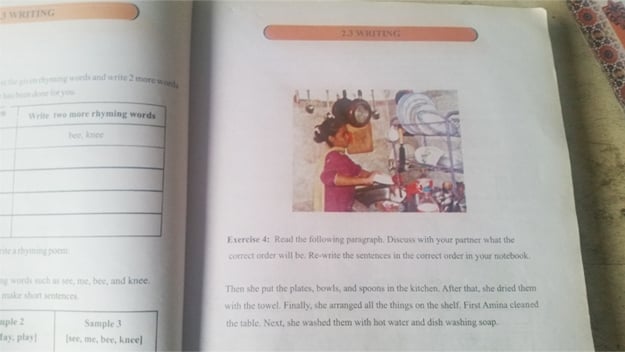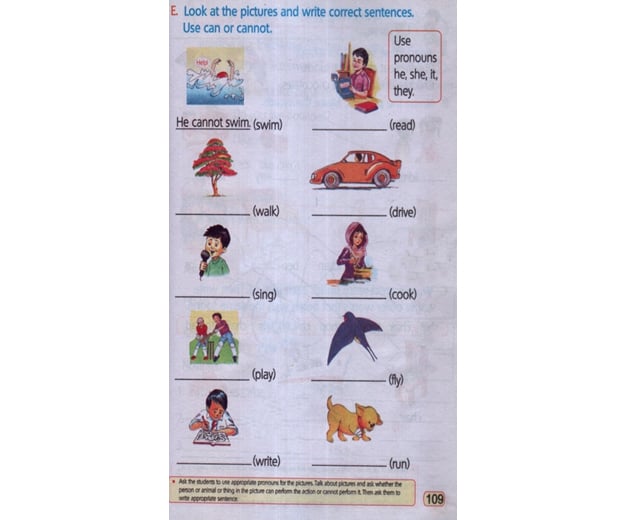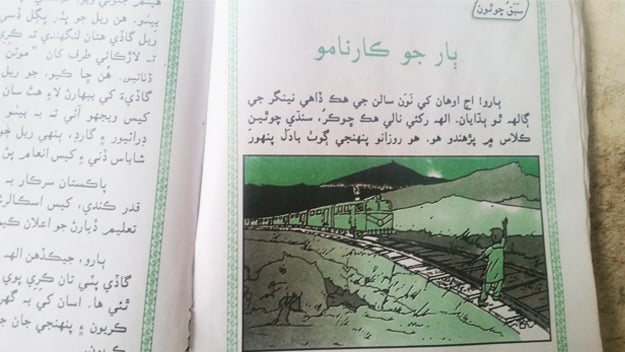Women cook, men work: Gender bias rife in Pakistani textbooks
Experts say women are depicted as accessories and not as main subjects in academic content.

Experts say women are depicted as accessories and not as main subjects in academic content. PHOTO: AFP
Outright sexist quotes and images, such as, “A hundred sons are not a burden but one daughter bows our heads” is common in one of the many gender-biased textbooks that a majority of the school-going children are exposed to in this country.
During Pervez Musharraf’s era, the country decided to reform textbooks to ensure gender parity with the help of United Nations Educational, Scientific and Cultural Organization (Unesco) but a 2015 study reveals the books remain as biased as they were in 2004. Masculinity and ‘male knowledge’ prevails while female representation is limited to roughly 20% in characters and pictures. Fewer women are shown in nondomestic pursuits.
 The picture and the text of this exercise is about a young girl working in kitchen. Depiction of girls and women in domestic roles is common in Pakistani textbooks.
The picture and the text of this exercise is about a young girl working in kitchen. Depiction of girls and women in domestic roles is common in Pakistani textbooks.Another study, conducted by former book reviewer at Punjab Textbook Board Aamir Riaz, corroborates these findings. His research, which looked at content for grade one till 10 for year 2014-15, confirmed that textbooks had minimal women representation, urban biases, men-dominated occupations and specified roles for women, such as cooking and cleaning.
Study findings: ‘Textbooks full of gender, urban biases’
Through such representation in textbooks, Riaz says gender biases are ingrained in children’s minds from a very young age. “This is image making; the message for women through texts and pictures is very clear,” Riaz explains.
Elaborating this point, course specialist at The Citizens Foundation (TCF) Ali Nadeem says women are depicted as accessories instead of main subjects in Pakistani textbooks and that this skewed representation is, in a way, a reflection of our society’s mindset.
Rukhsana Sattar, a teacher at a government school for girls in Karachi’s Baldia Town, proves Nadeem’s point. Despite being a woman, she does not see any harm in textbooks that promote gender roles. “Men should do what their job is; I am not in the favour of women taking on what are essentially a man’s duty,” she argues.
However, she admits gender biases in textbooks could probably be the reason why many girls don’t pursue further education. “Our textbooks, which haven’t been revised in a long time, and more importantly, a family’s ideology plays a role in how girls are brought up,” she says.
Reinforcing gender stereotypes
Her colleague, Shehnaz Wahab, however, believes a person’s gender should not matter as at the end of the day, “God has given both men and women the ability to think and understand”.
 This exercise shows only one girl, who is cooking food, while boys are depicted multiple times doing a variety of activities, such as playing, swimming and reading. The exercise is found in English language textbook for Grade 2 published by Punjab Board and was part of Aamir Riaz's presentation to illustrate gender biases in the academic content.
This exercise shows only one girl, who is cooking food, while boys are depicted multiple times doing a variety of activities, such as playing, swimming and reading. The exercise is found in English language textbook for Grade 2 published by Punjab Board and was part of Aamir Riaz's presentation to illustrate gender biases in the academic content.“Gender bias is a product of people with conservative mindsets who have interpreted religion as a barrier for working women. To remove biasness in textbooks, we first need to change the mindset of our elders,” Wahab, who teaches Islamiat, Urdu and Science courses, stresses.
She says society and its rules are manmade and are not always 100% right.
‘Women are systematically educated into domesticity’
From a sociological standpoint, Habib University professor Severine Minote says the role of women outside home has been historically downplayed and, over time, women have internalised these gender roles.
“It is funny that most parents and schools, instead of raising their children with a sense of possibilities, end up raising them with a sense of constraints. In turn, kids can be cruel with each other; kids who know they are different get bullied just for that - being different,” Minote, who has a PhD in sociology and a diploma in social communication, says.
 This story from a Sindhi language textbook for Grade 4 talks about a boy's heroic act. Stories on achievements, big or small, of girls and women are usually missing.
This story from a Sindhi language textbook for Grade 4 talks about a boy's heroic act. Stories on achievements, big or small, of girls and women are usually missing.To tackle gender bias at schools, homes and in society, TCF’s Nadeem recommends that there should be an increase in the number of women represented in textbooks. “We should portray women in leading roles and add examples of physicist Marie Curie and teenage activist Malala Yousufzai in our textbooks,” he states.
Nadeem, however, warns that social values must be kept in mind when designing content in order to avoid offending anything or instigating negative effects. “While designing course and content, we need to keep in mind who the audience is. People for whom we design courses are mostly from conservative communities and if we design courses against community values, it will provoke hatred towards education and they might not send their girls to school,” he says.



















COMMENTS
Comments are moderated and generally will be posted if they are on-topic and not abusive.
For more information, please see our Comments FAQ